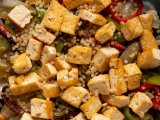Glutamine: what is this amino acid used for in diets?

We see it mentioned in sports supplements, in nutrition magazines, and even in some post-operative diets. But what is glutamine really used for? Is it an essential nutrient? And do we really need to consume more of it?
Here's a closer look at an amino acid that's not just for bodybuilders!
What exactly is glutamine?
Glutamine is an amino acid - in other words, one of the little "building blocks" that make up proteins.
It is said to be "semi-essential", as our bodies can manufacture it, but not always in sufficient quantities, particularly in cases of stress, injury, illness or intense effort.
It is present in the muscles, blood, brain and digestive system. In other words, it's got plenty to do.
What does glutamine do for the body?
It has several key roles:
1. Regenerating the intestinal wall
Glutamine is the main source of energy for intestinal cells. It helps repair the digestive mucosa (interesting in cases of digestive disorders, diarrhea, intestinal permeability...).
Source: Clinical Nutrition, 2001 - "Glutamine and intestinal barrier function".
2. Support the immune system
Immune cells (lymphocytes, macrophages) also use glutamine as fuel.
In times of physical stress (illness, surgery, intensive training), our needs increase.
Source: Nutrition Reviews, 2008 - "Glutamine metabolism and immune function".
3. Promoting muscle recovery
That's why it's so popular with athletes. Glutamine contributes to post-workout recovery, preventing muscle catabolism (muscle loss) and reducing fatigue.
Source: International Journal of Sport Nutrition, 2004 - "Effects of glutamine supplementation in athletes".
Where is glutamine found naturally?
There's no need to run to the pharmacy to get it: glutamine is found in food, mainly in animal and vegetable proteins.
Foods rich in glutamine :
- Eggs
- White and red meat
- Fish
- Dairy products (yoghurt, cottage cheese, etc.)
- Pulses (lentils, chickpeas)
- Cabbage, spinach, parsley
Please note: Cooking may slightly reduce its content. If you're looking to preserve some of these nutrients, choose raw or gently cooked products.
What about dietary supplements?
Glutamine is sometimes recommended:
- After surgery, to support tissue repair
- In case of digestive disorders (leaky gut)
- For athletes in the intensive recovery phase
- For certain people suffering from deficiencies or immunodepression
But for a healthy person with a balanced diet, dietary intake is more than sufficient. Supplements should be used only as occasional support, and only on the advice of a health professional!
In short: a discreet but essential amino acid
Glutamine acts a little like a silent repairman: it doesn't make any noise, but it supports your intestines, your immune system, and your muscle mass on the quiet.
There's no need to over-consume it, but it's interesting to know that it's naturally present in simple, everyday foods. A good reason not to skip your morning eggs or evening lentils;)
You may be interested in:
 Adèle Peyches
Adèle Peyches

